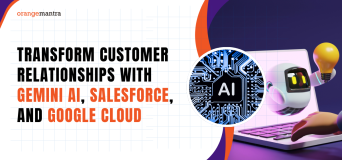
Here’s what you will learn:
When it comes to life-changing technologies, quantum computing is poised to emerge as the number one in the list. Once it becomes mainstream, the technology will disrupt the entire industrial landscape, from medicine to finance, advanced manufacturing, telecom and cybersecurity, and beyond as well. Even though quantum computing is still decades away from becoming a tangible reality, businesses should start gearing up for the next evolution. Before you think about the prep up for your business, you need to get an in-depth understanding of the technology and the way it will open up new opportunities.
Understanding Quantum Computing
Conventional computers work on the principle of encoding and representing data as either a “0” or “1”, known as “bits”. Quantum computers, on the other hand, rely on qubits, which represent data in multiple states such as “0” or “1”, both at the same time. The most amazing fact about the algorithms designed with qubits (basic units that are used to process information in a quantum computer) is that they can reduce billions of years of computing time to merely seconds or hours or days. Essentially, quantum computers apply the fundamentals of quantum mechanics to accelerate the process of solving even the most complex computations. This makes them capable of making ultra-fast calculations even on the most complex data sets, making these computers probably the biggest discovery ever.
The Rise Of Quantum Computing-What lies ahead?
Compared to conventional computing, the potential of quantum computing is immense as it offers a massive efficiency advantage over the former. This form of computing is capable of handling problems which comprise a combination of variables and solutions, usually addressed as optimization problems. Such problems are commonplace in various industries including software design, finance, logistics, finance, genomics, and more. For example, a major construction project would need to handle multiple parameters such as raw materials, equipment, labor, compliance requirements, and budget to arrive at an optimal solution that ensures completion within timelines and maximization of ROI. The most complex optimization problems stump the classical computers but make an easy game for a quantum machine.
Types Of Quantum Computing
Primarily, there are three types of quantum computing, with each type differing by the amount of qubits (processing power) required, the number of possible applications, and the time needed to become commercially viable. Here are the three types explained:
-
- Quantum Annealing
Ideally meant for optimization problems, quantum annealing aspires to identify the best configuration among a range of possible combinations of variables. Consider a global experiment purposed at optimizing every single airline route, airport schedule, fuel costs, weather data, and passenger information for driving cost efficiency in travel and logistics solutions. While conventional computing would take centuries to find out an optimum solution to this problem, it could be solved in just a few hours with quantum computing. Quantum annealing is regarded as the most narrowly applied and the least powerful form of quantum computing.
-
- Quantum Simulations
With this type, the specific problems in quantum physics, which could not be solved by classical systems, are explored. One of the areas where it can be used extensively is quantum chemistry. For instance, protein folding simulation could be done with quantum simulators, thus enabling researchers to test novel treatments for diseases such as Alzheimer’s and Parkinson’s. The realistic mapping of protein folding sequence, therefore, would serve as a major and life-saving healthcare breakthrough.
-
- Universal Quantum Computing
The most powerful type of quantum computing is universal quantum computing and these computers happen to be the hardest to build as well. It would require as many as 100,000 qubits, while there are only around a 128 of them that are accessible today. The power of these computers can be judged from the fact that it could be directed to perform extremely complex computations and yet give a quick solution. In the distant future, these computers could revolutionize the artificial intelligence landscape by enabling machine learning which is faster as compared to that of classical computers.
Industry-Specific Benefits Of Quantum Computing
Now that you understand the meaning of quantum computing and its types, it is also important to know how the technology can impact various industries in the future.
-
- Healthcare
It could be leveraged to improve the quality of healthcare and assist in medical research as well. It could collect and sort through all the possible gene variants simultaneously and discover the most effective treatments and drugs for diseases caused by genomics mismatches.
-
- Finance
Quantum computing could be used to develop futuristic financial modeling tools and algorithms for assisting the areas of financial services, investment, and risk management.
-
- Cybersecurity
Another area where this technology could help is cybersecurity as it has the potential to secure data through powerful post-quantum cryptography solutions.
-
- Energy
The energy sector could leverage quantum computing solutions for managing resources from diverse sources and addressing the challenges related to energy optimization where classical computers have limitations.
-
- Agriculture
Another industry that could benefit from quantum computing is agriculture as the technology could enable the creation of high-quality fertilizers through novel catalytic combinations in replacement of the conventional ammonia-based fertilizers.
Looking ahead towards a better, brighter future
Considering the immense benefits that quantum computing could serve, it can surely be referred to as the most wonderful technology of the future. Even though this may take many years to spring into action, there is still a need to be prepared when it comes into mainstream usage. The idea is to have a technology partner that can educate you about this technology as well as help you align your existing set up with the changes that will take place once you embrace this technology on the future.




